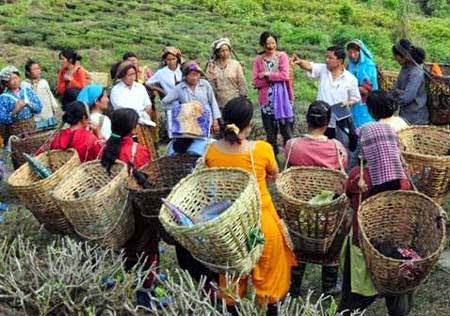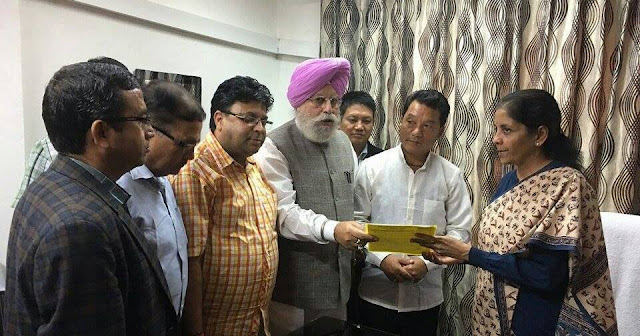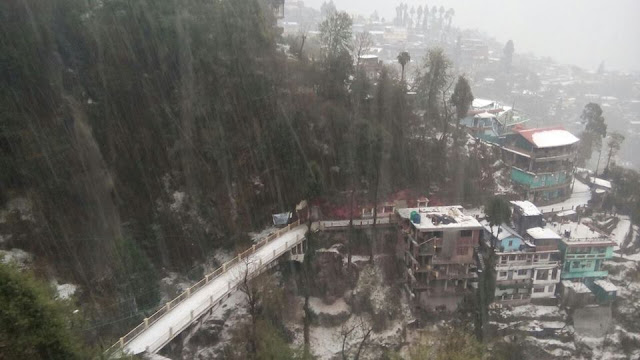DTA अनि CCPA को दार्जीलिङ पहाड़को चियाकमानहरुमा काम संचालित राख्ने कोशिशको घोर निन्दा गरौं!
विश्वलाई त्रासित बनाएको कोरोना भाइरसको महामारी विरुद्ध हर एक देश अनि संस्थाहरु एकबद्ध भएर सक्रिय रुपमा काम गरिरहेका छन्। हाम्रो देशमा पनि यो भाइरसको विस्तारलाई रोक्नको निम्ति सरकारले कतिपय मापदण्ड या नियमहरु तय गरेका छन्। सरकारले जनाएका धेरैवटा सावधानीहरु मध्ये 'शारीरिक दूरी' प्रमुख हुन्। यस विषयलाई प्राथमिकता दिदै सरकारले २१ दिनको 'भारत लॉकडाउन' को घोषणा पनि गरेका छन्। यस निर्णयलाई देश भरिका राज्यहरुले अनिवार्यतापुर्वक पालन गर्ने सहमति जनाएका छन्। COVID-19 को रुपमा प्रकट भएको विश्वरुपी महामारीलाई ठप्प गर्न हरेक व्यक्ति अनि सरकारको जिम्मेवारी बन्न पुगेको छ।
हालैमा कालेबुंग निवासी कोरोना भाइरस पिडित महिलाको मृत्युको घटनाले हाम्रो पहाड़ पनि भाइरसको चपेटमा आइसकेको कुरा प्रष्ट हुन्छ। उनको मृत्यु North Bengal Medical College, Siliguri मा भर्ना भएको एक दुइ दिन भित्रमा २८ मार्च २०२० को दिन भयो। पहाड़मा घटित यो प्रथम मृत्युले सबैलाई सोचनीय स्थितिमा पुर्याएको छ र सरकारी स्वास्थ चिकित्सा व्यवस्था प्रति धेरै प्रश्नहरू उठ्न स्वाभाविक नै हो। के सरकारले यस्तो संकटको परिस्थिति सामना गर्न आवश्यक तयारी गरेका छन् त ? के हाम्रा क्षेत्रका अस्पतालहरु आवश्यक चिकित्सा सुविधाहरू बारे सुचित थियो त ? सामाजिक संजालमा अडियो विडियो मार्फत कोरोना संक्रमित लक्षण हुने व्यक्तिहरुले उचित ढंगमा उपचार नपाएको गुनासो गरिएको खुलासाले हाम्रो सरकारी चिकित्सा प्रावधान कति जिर्ण अवस्थामा छ भन्ने कुराको पुष्टी गर्दछ। यस घटनालाई लिएर अस्पतालको अवस्था मात्र नभएर डाक्टर र चिकित्सा कर्मचारीहरु माथि प्रश्न उठी रहेको छ। तर वास्तवमा कुरा बुझ्नु हो भने यी प्रश्नहरुको उत्तर दिने दायित्व सरकारको हो। उपचार गर्ने डाक्टर अनि चिकित्सा कर्मचारीहरुले पनि सरकारद्वारा पाउनु पर्ने आवश्यक 'Personal Protective Equipments (PPE)' पाएका छैनन्। उनीहरु त आफ्नो दायित्वलाई पुरा गर्न ज्यानलाई जोखिममा हाल्दै भए पनि सक्रियतापुर्वक अघि बढिरहेका छन्।
 |
| Darjeeling Tea Workers |
अर्को आश्चर्यजनक कुरो के छ भने, यस्तो महामारीको समयमा पनि दार्जीलिंग टी एसोशियेसन (DTA) अनि कन्सल्टेटिव कमिटि अफ प्लानटेसन एसोशियेसन (CCPA) ले चिया बगानहरुलाई पुर्ण रुपमा संचालन गर्ने मांग बंगाल सरकार सामु राखेको छ। विश्वभरिनै लॉकडाउनलाई गम्भिरतापूर्वक पालन गरिरहेको बेला हाम्रो चिया बगान कर्मचारीहरु भने आज पनि बाध्य भएर बगान धाइरहेका छन्। बंगाल सरकारले पनि यस मांग माथि विचार गर्ने कुरा स्टेट्सम्यान खबरकागजबाट बुझ्नमा आईदैछ। चिया बगान कर्मचारीहरुको हीत अनि सुरक्षा को जिम्मा DTA अनि CCPA जस्तो संस्थाहरुले लिनु पर्ने बेलामा, अझ कर्मचारीहरुलाई खाड़लमा हाल्ने मेलो गरिदैछ। DTA अनि CCPA का सदस्यहरु लगायत चिया बगानका मालिकहरुले दर्शाएको यस्तो असंवेदनशील निर्णयलाई हामी घोर भर्त्सना गर्छौ। के उनीहरु साँचै कोरोना भाइरसको प्रभावबारे अज्ञात छन्? या उनीहरुलाई लाग्छ, पुस्ता पुस्ता देखि घाउ, चोट अनि दु:ख खप्नु सक्ने कर्मचारीहरुले यो कोरोना भाइरसलाई पनि आरामले पचाईदिने छ। के चिया बगान कम्पनीले उगाउने भव्य नाफाको सामु चिया बगान कर्मचारीहरुको जीवनको मूल्य यति तुच्छ छ ?
पुरा पश्चिम बंगालमा लॉकडाउनको आदेश दिने सरकारले, कसरी चिया बगानका कर्मचारीहरुसंग पक्षपात गर्न सक्छ? चिया बगान र कारखानासंग जुडिएको प्रत्येक काम नै संगठित ढंगमा गर्नु पर्ने हुन्छ, यसैले 'शारीरिक दूरी' पालन गर्न असम्भव छ। चिया बगान खोलिनु नै यहाँ काम गर्ने कर्मचारीहरुको ज्यानलाई खतरामा पार्नु हो अनि उनीहरुको वर्तमान अनि भविष्यलाई जोखिममा हाल्नु हो। कथांकल दुर्भाग्यवस भोलीको दिनमा केहि क्षति पुग्न गए, के बंगाल सरकार, DTA अनि CCPA ले सम्पूर्ण चिया बगान कर्मचारीहरुको अनि उनीहरुको भावी पिडाको जिम्मेवारी लिने छन् त? त्यस बखत शायदै DTA अनि CCPA ले निर्धारित गरेको चिया बगान केन्द्रित 'Strict Safety and hygiene guidelines' प्रभावशालि हुने छन्।
विशेषगरि, DTA अनि CCPA को मांगबारे स्थानीय प्रसाशन (GTA) अनि अरु राजनैतिक दलहरुको परिप्रेक्ष्य बारे केहि प्रश्न गर्न चाहन्छौ। प्रथम, DTA र CCPA ले गरेको मांग अनि कर्मचारीहरुको सुरक्षाबारे विवाद हुँदा, GTA का प्रतिनिधि, दार्जीलिंग जिल्लाको MP अनि MLA हरुको के-कस्ता प्रतिक्रियाहरू आएका छन् ? दोश्रो, यस्तो विवाधित क्षणमा पहाड़को स्थानीय राजनैतिक दलहरु साँचै नै श्रमिकवर्गको जीवन र सुरक्षाको अधिकारको पक्षमा छ भने, किन DTA र CCPA को निर्णयको विरुद्ध किन निमुखा दर्शक बनिरहेको छन् त ? यदि आफ्नो राजनैतिक सहायकहरुलाई खुशी पार्न मात्रै राजनीति गर्न हो भने, आफ्नो कुम्लो कटेरो बाँधे हुन्छ। तेश्रो, एकातिर हाम्रो राजनैतिक प्रतिनिधिहरु मुख्यत: सांसद क्षेत्रको भावी योजनाहरूबारे ट्वीट गर्नमै व्यस्त देखिन्छ भने अर्कोतिर DTA र CCPA को हालैको निर्णयलाई लिएर आफ्नो मन्तव्य राख्नबाट टाढ़िएको सर्वविदित नै छ। उता पहाड़का तिन विधायकहरुले पनि DTA र CCPA को अमानविय निर्णय, जसले हजारौ श्रमिकहरुको ज्यानलाई जोखिममा पारेको छ, त्यस विरुद्ध चुँ सम्म पनि गरेका छैनन्। राज्य सरकार, विधायकहरु र सांसद, मालिक पक्षले खुल्लम-खुल्ला श्रमिक बर्गको जीवन र सुरक्षाको अधिकारको हनन् गरेको देख्दा देख्दै पनि सबै किन मौन छन् ? उनीहरुको मौनताले हामीलाई यो प्रश्न तेर्साउनुमा मजबूर गर्छ कि, के सरकार, विधायकहरु र सांसद, उही मुट्ठीभर मालिक पक्षले मात्र बनाएको हो ? हाम्रो प्रतिनिधिहरु यस्ता विपतको क्षणमा पनि DTA र CCPA को कमानलाई संचालित राख्ने अमानवीय र निन्दनीय कोशिशको विरुद्धमा एक शब्द पनि किन बोल्नु सकिरहेको छैन त ?
यसै संदर्भमा हाम्रो छिमेकी राज्य आसम सरकारले २१ मार्च २०२० को दिन नोटिफिकेसन नो: L.E.16/2018/4035-98 मार्फत चिया बगानहरुलाई पूर्णरुपमा लॉकडाउन गर्ने आदेश दिएका थिए। यस नोटिफिकेसन अनुसार चिया बगानको लॉकडाउन साथसाथै कर्मचारीहरुले पाउने हाजिरा, उनीहरुको रोजगार अनि अधिकारहरु माथि ठप्प नलागिने निर्णय लिएका थिए। तर हालैमा चिया कमानको मालिक वर्गहरुको प्रेसरमा आएर आसम सरकारले आफ्नै निर्णय फिर्ता लिने भएका छन। र यस्तो स्थितिमा हाम्रो पनि क्षेत्रको जन प्रतिनिधिहरुको साथै राजनैतिक दलहरुको मौनता, DTA र CCPA को निवेदन, बंगाल सरकारको मनोवृत्ति हेर्दा मालिकवर्ग संग केन्द्र र राज्य सरकार दुवै मिलेर मजदुरहरुको जीवन संग खेलवाड गर्दैछन् भन्ने कुरा बोध हुन्छ। के चिया बगानहरु पृथ्वीमा नभएर अर्कै ग्रहमा छन् जहाँ कोरोनाको खतरा छैन ? के चिया बगानको मजदुरहरु 'Right to life and safety' देखि वञ्चित छन्? बंगाल सरकारले DTA अनि CCPA को मांगलाई स्वीकार गर्नु नै मजदुरहरुको विरुद्ध उभिनु हो। यस्तो अमानवीय सोंचको हामी कडा शब्दमा खण्डन गर्छौ।
जब सम्पूर्ण विश्वनै एकबद्ध भइ यो महामारीको विरुद्ध संघर्ष गर्न कम्मर कसी रहेको छ भने यहाँ दार्जीलिंगमा चाहिं केहि तुच्छ विचार भएका चिया कमानका मालिकहरु र उनीहरुका चम्चाहरुले DTA र CCPA को संकीर्ण स्वार्थ पूर्ति हेतु कमानको काम बन्द हुन नदिने निर्णय लिएको छ। विधित नै छ कि चिया कमानमा काम गर्ने मजदूरहरु अधिकांश नै गोर्खा अनि आदिवासी समुदायकाहरु छन्। त्यसैले मालिक पक्षको कमानलाई सुचारु राख्ने निवेदनले उनीहरुको क्रुर परजीवी मानसिकतालाई अभिव्यक्त गर्दछ। DTA अनि CCPA ले मजदूरहरुलाई कामबाट केहि दिन विश्राम, राशन पानी, अग्रिम बेतन आदि सुविधाहरु प्रदान गर्नको सट्टा कमानको काम चालु राख्ने निवेदन टक्राई आफ्नो शोषक परजीवी प्रवृतिको झलक स्पष्ट देखाएको छ। हामी मालिक पक्षको यो अमानवीय निर्णयको कडा शब्दमा भत्सर्ना गर्दछौ अनि यो संकटको समयमा मजदुरवर्ग संग काँधमा काँध मिलाई उनीहरुको अधिकारको निम्ति आवाज उठाउन कटिबद्ध छौ।
यसर्थ सरकार समक्ष हामी यो मांग राख्दछौ कि भारत लॉकडाउनको अवधि चियाकमानहरु सम्पूर्ण रुपमा बन्द राखियोस अनि चिया श्रमिकहरुलाई अग्रिम वेतन, राशन पानी, स्वास्थ्य सेवा र अन्य सहुलियतहरु समयमा प्रदान गरियोस्!
सरकारी स्वास्थ्य व्यवस्थाको हालत बुझी सकेको छौं, हामी आफै सचेत र सावधान भएर घर भित्र नै बसौं, शारीरिक दुरी पालन गरेर कोरोनाको प्रकोपबाट बाचौं र अरुलाई पनि बचाउँ!
गोर्खा स्टूडेंट्स, जे.ऐन.यू ०२.०४.२०२०

























